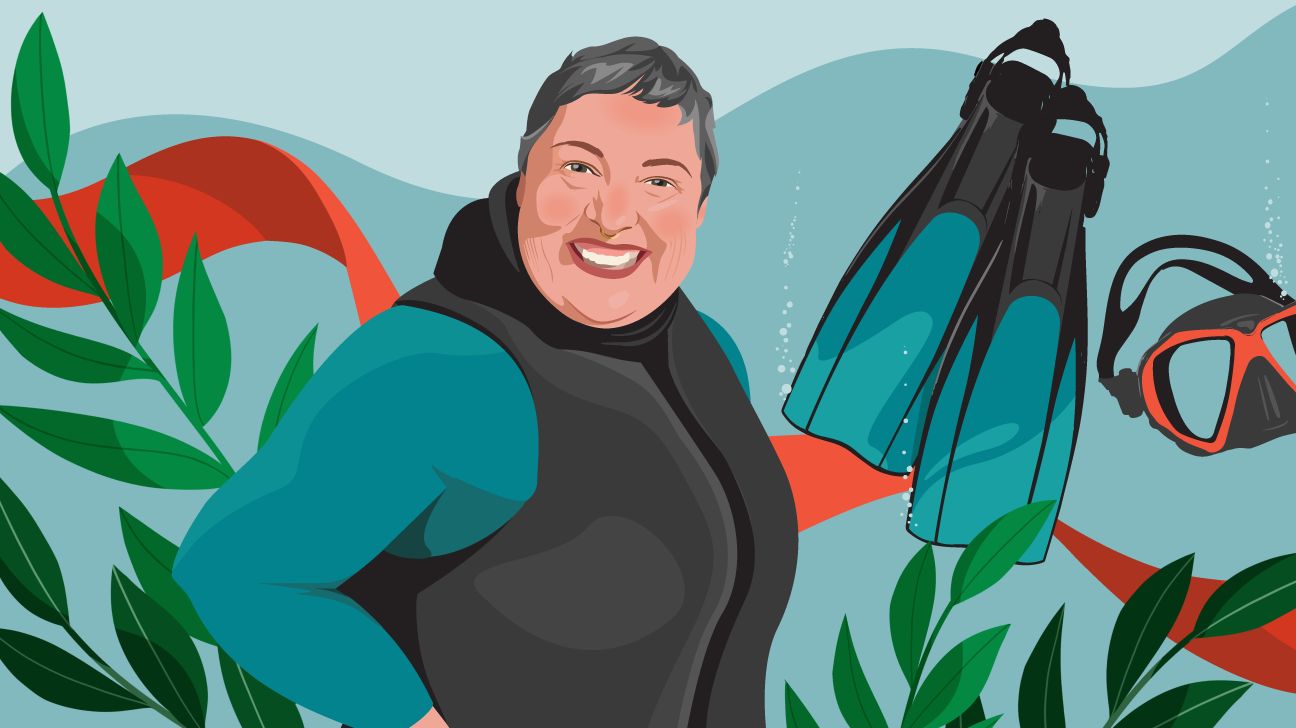Irene Marcoux’s experience making room for herself as a fat person in aquatics gave her a new purpose: To make the water a safe space for everyone, regardless of body size.

It started with a mermaid obsession and a youth spent hanging around the local pool.
Irene Marcoux has been around water for most of her life, and when she talks about how being submerged makes her feel, it’s hard not to get excited, too.
When it comes to aquatic sports, she’s done it all: freediving, scuba diving, swimming, synchro, and, yes, “mermaiding.” Sometimes called water ballet, mermaiding is a sport that involves swimming while wearing a costume mermaid tail.
She makes the water, the sea, and even the local pool seem like otherworldly places where anything is possible. And that’s exactly her goal — to show others that anyone can do what she does, you just have to take the plunge.
Summer days meant spending time at the local pool for Marcoux, tagging along with her older sisters who left her behind to flirt with boys. Despite the short outdoor swim season, the pool was a social gathering place.
It’s also where her love affair with aquatic activities began — speed swimming, where she was always the slowest, but that didn’t stop her, and synchronized swimming after a coach spotted her as a child pretending to be a mermaid in the water.
While Marcoux warmly describes the freedom of movement that came with synchro, she’s not shy about pointing out the sport’s darker side, including eating disorders and weight stigma.
“It was always like, you lose weight or stick in that fat gut,” she says.
Receiving a Crohn’s disease diagnosis in her early teens forced her to quit the sport, but she remained a self-described “pool rat,” hanging out and helping out with activities for free.
The local pool was a constant in her life.
Marcoux was introduced to scuba diving in college while taking a physical education class. From the outset, she had lofty goals, with plans to eventually become a divemaster. These highly trained professionals have the knowledge and expertise to organize and lead recreational dives.
After 15 weeks of pool-based exercises, she and her peers were encouraged to get certified. Marcoux jumped at the chance despite being a cash-strapped student.
“You’re just enjoying being in the water. For me, that was like my favorite element on this planet,” Marcoux says.
And with gear, there was no struggling to breathe like with synchronized swimming.
But scuba, too, came with weight stigma and barriers to access. Marcoux comfortably describes herself as fat and is adamant the word is just a descriptor and not inherently negative. She recalls several encounters where she has been made to feel like she didn’t belong.
“People look at me funny. I’ve had so many people tell me, ‘Oh, you’re so brave,’” she remembers. “And it made me kind of angry.”
She also points out the equipment-related barriers for fat people in sports like scuba. There’s a lack of easily accessible plus-size options, so it’s tricky for beginners with bigger bodies to get into the sport. Marcoux herself has to resort to custom-made suits, an expense that might drive newcomers away from the sport forever.
That’s part of what has propelled her into her current instructor role. When she’s not at her “boring” day job, she’s teaching others to embrace water sports — regardless of how they look.
“You have no weight in the water,” points out Marcoux.
It’s something that can come in handy with certain aspects of water sports, she says.
And yet, people still focus on her weight.
During the pandemic, Marcoux was chosen as an ambassador for Girls That Scuba, an organization committed to celebrating women in scuba.
But after being featured in the program’s social media posts, she experienced first-hand the vitriol that can come with being a fat person promoting athletics. The comments were harsh. But while she sometimes felt hurt, she says the hate lit a fire in her.
“Really? Let’s do it. Let me start wearing bikinis,” she challenges.
Marcoux is determined to continue pursuing her passion despite the obstacles she has faced and continues to face. She’s also steadfast in showing others they belong in the water and convincing them it’s OK to be in a bigger body in a swimsuit.
When teaching others of any size, she leads with compassion, an approach that has netted her a reputation for initiating newbies to aquatic sports. It’s something she’s proud of and embraces freely.
In addition to local instruction, Marcoux also spends some of her free time answering DMs from newbie divers who come to her with questions. Folks also reach out to thank her for representing fat bodies in aquatics and athletics in general.
What should people in bigger bodies consider when thinking about trying any aquatic sport? Marcoux recommends keeping in mind the following: You think everyone’s looking at you. But in reality, they’re not paying attention at all.
The same advice applies to anyone who is self-conscious about their abilities.
“Water sports are incredibly adaptable,” she says. Whether you’re entirely new to moving your body or a fitness veteran, water will move around you, no matter your body size. It literally adapts to you.
She points out that you’ll find pride in trying even if you don’t fall in love with a sport.
“Stop doubting yourself, and just try it.”
Irene Marcoux is an aquatic professional with over 30 years of aquatics education experience. In addition to being a safety focused mermaid instructor trainer, Marcoux is also a PADI course director, free diving instructor, first aid instructor and instructor trainer, certified lifeguard, national lifeguard instructor trainer and examiner, and former synchronized swimming swimmer, coach, and learning facilitator. You can find her on Instagram.


